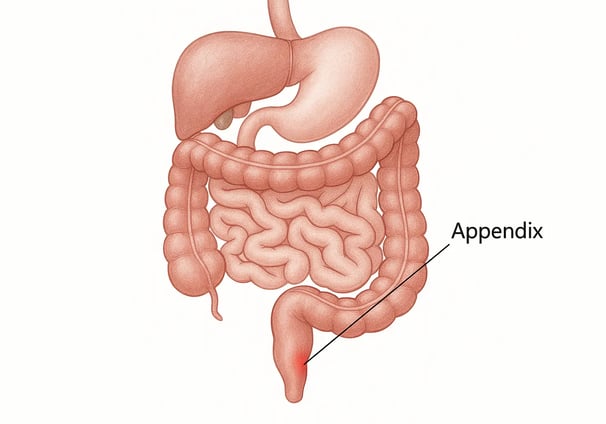What Is the Appendix? Role, Appendicitis Symptoms, and Treatment Explained
What is the appendix? Learn about its possible functions in the human body, the causes and symptoms of appendicitis, and why timely treatment is essential.


Understanding the Appendix and Appendicitis: Functions, Symptoms, and Treatment
The appendix is a small, finger-like pouch located in the lower right side of the abdomen, where the small and large intestines meet. For years, it was considered a vestigial organ—a leftover from human evolution with no real purpose. However, recent scientific studies suggest the appendix might serve several important roles in the body.
What Does the Appendix Do?
Although its exact function is still under research, the appendix may play a role in the following areas:
1. Immune System Support
The appendix contains lymphoid tissue, which helps produce and regulate white blood cells. This supports the immune system, especially during early life, and may aid in protecting the digestive tract from infections.
2. Gut Microbiome Reservoir
Some researchers believe the appendix acts as a “safe house” for beneficial gut bacteria. During gastrointestinal illnesses, such as severe diarrhea, the appendix may help restore the balance of good bacteria in the intestines, promoting quicker recovery.
3. Potential Digestive Function (Under Debate)
A less widely accepted theory suggests the appendix might assist in digesting certain plant materials like cellulose. However, this hypothesis is still debated within the scientific community.
Can You Live Without an Appendix?
Yes. The appendix is not essential for survival. Many people live perfectly healthy lives after undergoing an appendectomy—a surgical procedure to remove the appendix. This is most commonly performed to treat appendicitis, a condition that can become life-threatening if not treated promptly.
What is Appendicitis?
Appendicitis is the inflammation of the appendix and is considered a medical emergency. If not treated, it can lead to a ruptured appendix and serious complications.
Common Causes of Appendicitis
The exact cause of appendicitis isn’t always clear, but it typically involves:
Obstruction: Blockages from fecal matter, foreign objects, or swollen lymph nodes.
Infection: Bacterial overgrowth within the appendix.
Inflammatory diseases: Conditions like Crohn’s disease or ulcerative colitis may trigger appendicitis.
Symptoms of Appendicitis
Watch out for these common warning signs:
Severe abdominal pain—often starting near the navel and shifting to the lower right side.
Loss of appetite
Nausea and vomiting
Low-grade fever
Swelling and tenderness in the abdomen
Changes in bowel habits—such as constipation or diarrhea
Treatment for Appendicitis
If you suspect appendicitis, seek immediate medical attention. The standard and only effective treatment is an appendectomy. This can be performed through:
Open surgery
Laparoscopic (minimally invasive) surgery
Doctors may administer antibiotics before surgery to reduce infection risk, but antibiotics alone are not a long-term cure. There are no home remedies or over-the-counter treatments for appendicitis. Delaying medical care can lead to a ruptured appendix, a potentially fatal condition.
Conclusion
While the appendix’s role in the human body is still being studied, it may contribute to immune support, maintain a healthy gut microbiome, and possibly aid digestion. Despite these functions, the appendix is not vital, and its removal typically has no long-term negative effects.
If you experience symptoms of appendicitis, such as sharp pain in the lower right abdomen, nausea, and fever, don’t ignore them. Prompt surgical intervention is essential to avoid life-threatening complications.
Frequently asked questions
❓ What is the appendix?
The appendix is a small, tube-shaped organ located in the lower right abdomen, near where the small and large intestines meet. While once thought to be useless, it may support immune function and help maintain gut health.
❓ What does the appendix do?
Though not fully understood, the appendix may:
Support the immune system with lymphoid tissue.
Serve as a backup storage for beneficial gut bacteria.
Possibly aid in digesting plant fibers (though this is debated).
❓ Can you live without your appendix?
Yes. The appendix is not a vital organ. People can live normal, healthy lives after it is removed through an appendectomy.
❓ What are the first signs of appendicitis?
Common early symptoms include:
Sudden pain near the belly button that shifts to the lower right abdomen.
Nausea or vomiting.
Fever and abdominal swelling.
Loss of appetite.
❓ What causes appendicitis?
Appendicitis is usually caused by:
A blockage inside the appendix (e.g., feces, foreign object).
A bacterial infection.
Inflammatory conditions like Crohn’s disease.
